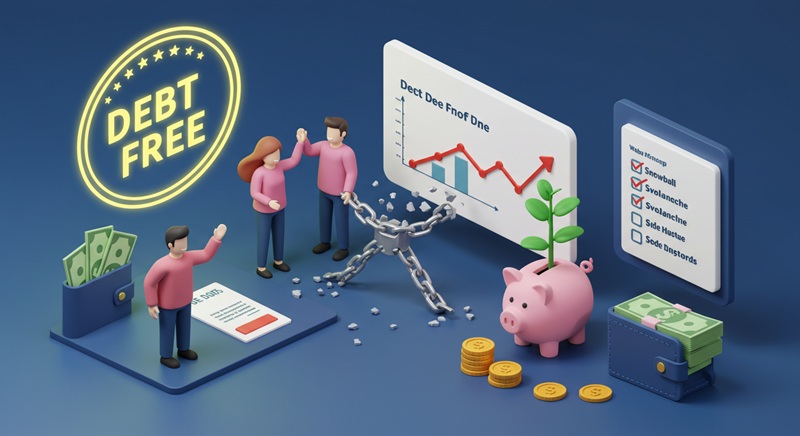Emergency Funds: Why You Need One Now More Than Ever

What would you do if you get fired tomorrow or experienced a sudden medical bill? Life is full of surprises, and not all of them are good. That’s where an emergency fund comes in—a potion of funds set aside for unexpected expenses such as car repairs, medical bills, or sudden loss of job. With rising inflation, economic instability, and unpredictable emergencies, having a financial safety net is more important than ever. Without one, you could end up in debt or struggling to cover basics. In this post, we’ll break down why emergency funds are crucial and how to start building yours today. For more money-saving tips, check out other articles in this blog!
The Basics of an Emergency Fund
As noted above, an emergency fund encompasses money set aside for life’s surprises—think of it as a financial cushion for times of trouble. It can’t be used for vacations, shopping or that new gadget you’ve been eyeing. Instead, it’s your backup plan when things go wrong such as a car breaks down, unexpected lose your job, or a sudden medical bill.
1. Why You Need Emergency Savings
Consider this: Your fridge stops working, and the repair costs $500. Without savings, you might have to put it on a credit card and pay interest later. But with an emergency fund, you can handle the cost without stress. Most studies recommend having a 3-6 months’ worth of living expense saved—enough to cover basic needs such as rent and food, and bills when you do not have an income.
What Counts as an Emergency?
- Job loss – Cater for bills while you look for work.
- Medical emergencies – Covers unforeseen ailments or prescriptions.
- Car or home repairs – Deals with unexpected repairs that may be costly.
Pro Tip: Have a separate account for this money. A high-return savings account is a great place to store it—easy to access but not too tempting to spend. Start small, even $20 a week adds up. Your future self will thank you!
2. The Growing Need for Financial Security
At the moment, having an emergency fund isn’t for the wealthy —it’s essentially a basic need. With prices rising faster than pay checks (thanks to inflation!), surprise expenses have a big toll on budgeting. Check out our article on how to stick to a budget for more tips on the role of an emergency fund on a budget. Think about it: A $1,000 car repair or medical bill can lead a lot of people into credit card debt.
Why Right Now Matters
- Inflation struggles: Groceries, gas, and rent cost more, putting pressure on budgets.
- Unstable jobs: Layoffs occur, and gig (freelance) work isn’t always reliable.
- Crises don’t wait: A sudden illness can wipe out savings fast.
One of my friends got his work hours cut, and his fridge needed an emergency repair since his family bunch cooks. Without savings, he’d have to take credit—adding stress to an already tough situation. But with an emergency fund, he covered the repair and settled all bill while looking for extra work.
The Debt Trap
Relying on loans or credit cards in emergencies leads to a trap. Interest piles up, making it harder to escape. A financial safety net keeps you from falling into that cycle.
Bottom line? The world’s is full of unforeseen surprises, but your savings should not have to suffer. Even small amounts add up over time—start today!
3. Calculating Your Emergency Fund Goal
Determining how much is enough can be overwhelming, but this should not be the case. The golden rule is to save for about 3-6 months' worth of essential expenses—that include all the amount needed to fully settle your monthly bill such as rent, groceries and utilities.
Factors to Consider when Creating an Emergency Fund
- Job stability matters: If your income is not constant (like freelancing), have up to 6 months. Learn more on the role of emergency funds when budgeting for an irregular income.
- Family size counts: More dependents = bigger safety net needed.
- Health risks: Chronic conditions? You might want extra cushion for medical costs.
During the Covid 19 pandemic, many people lost their jobs and could not secure another immediately, those that had an emergency funds were able to meet their needs as they looked for a way out.
Start Small, Think Big
Don't get stuck waiting to save "the perfect amount." Even $500 can cover a car repair or last – minute plane ticket for a family emergency. Use a free emergency fund calculator to break it into manageable chunks—like saving 50 from each pay check.
Pro Tip: Progress beats perfection. What matters is starting!
4. Smart Ways to Save Quickly
Putting up an emergency fund should not take years. With a good strategy, you can grow your savings much quickly than you think. Here's how to make it happen without feeling strained.
Cut Unnecessary Expenses
- Cancel unused subscriptions (that gym membership you rarely use?)
- Cook at home more (eating out just 2x less per month could save $100+)
- Switch to generic brands (medicine, groceries - often the same quality for less)
Make Saving Automatic
Set up an automatic transfer of just 25−25−50 per pay check to a separate savings account. Before you know it, you'll have 500−500−1,000 saved without even thinking about it.
Boost Your Income
- Try a side gig (food delivery, tutoring, or freelance work)
- Save windfalls (tax refunds, bonuses, or gift money)
Pro tip: Start small but stay consistent. Even 20 a week adds up to over 1,000 in a year.
5. Choosing the Right Savings Account
Determining where to keep your emergency funds is as important as building one. The right place should keep your money safe, earns interest, and be easily accessible.
Best Options for Emergency Savings
- High-yield savings accounts: Earn 4-5% interest while keeping your money accessible.
- Money market accounts: Similar to savings but sometimes come with debit cards for emergencies.
- Avoid these: Stocks, crypto, or long-term CDs - too risky or inaccessible when you need cash fast.
Keep It Separate (But Not Too Separate)
Open an account in another bank than your checking account. This prevents "accidental" spending and still ensure quick transfers when needed.
Remember: Your emergency fund isn't for growing wealth - it's for keeping you financially secure. Go for safety and accessibility over big returns. Some of the financial challenges faced by couple in their marriage can be settled by having an emergency fund.
Final Thoughts: Your Financial Safety Net Matters
Life can take an unexpected turn that can really hurt you if you were not prepared. That’s why having an emergency fund isn’t something nice, it’s a must. With rising costs, job insecurities, and unexpected expenses, being financially prepared can mean the difference between stress and stability.
The good news? You don’t need to save thousands overnight. Start small (even $20 a week) and watch your money grow. The key is to remain consistent, until you have a safety net that lets you handle emergencies without panic or debt.
Remember: Financial peace of mind begins with preparation. Take the first step today—open a savings account, or cut one small expense. Every little bit helps.
For more tips on smart saving and budgeting, explore our other articles. Your future self is waiting for you to take action!










.jpg)
